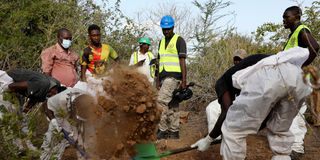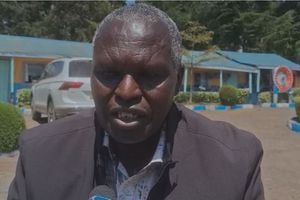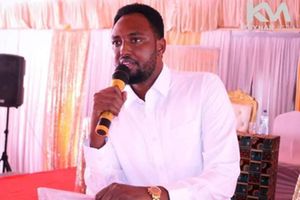Shakahola: Taskforce exposes legal, policy loopholes exposing Kenyans to religious extremism and cult-like practices

The exhumation exercise in Shakahola forest on June 5, 2024.
The lack of statutory clarity regarding crimes committed in the propagation of religious extremist ideologies has been identified as one of the many legal gaps that exposed Kenyans who died during the deadly fast in Shakahola Forest to religious extremism and cult-like practices.
These legal lapses allowed Kilifi cult leader Paul Mackenzie to conduct his cult-like activities within the expansive thicket unnoticed in the name of religion, claiming the lives of more than 429 members of his Good News International Church.
A task force formed by President William Ruto in the wake of the deadly fast to investigate and propose ways of regulating religious organisations has, in its report, identified factors that may have provided Mackenzie with a conducive environment to starve his followers to death.
According to the task force, the existing legal framework has gaps and it does not adequately address religious extremism, sects, cults and other similar outfits in Kenya that engage in practices detrimental to individual health and safety, the public interest and national values.
The task force noted that there is a lack of statutory clarity regarding the nature of crimes committed under the pretext of religion, as the current criminal law framework does not adequately address issues of religious extremism, cultism, and other crimes committed in the name of religion.
Read: Shakahola trial: Had I listened to my sister, my wife and child would still be alive, says witness
“This gap poses a difficulty in preferring criminal charges against individuals involved in the manipulation and exploitation of persons in the pretext of religion,” says the 18-member committee chaired by Rev Mutava Musyimi.
According to the task force, this legal gap poses a threat to national security and social cohesion due to the harm inflicted on the public.
In Mackenzie’s case, the state had to rely on the Prevention of Terrorism Act to bring charges of radicalisation and religious extremism against the preacher for starving his followers to death and brainwashing others into accepting his ideologies.
The task force also highlighted the lack of regulation regarding online broadcasting by religious organisations in light of the rise of social media platforms that serve as communication channels for disseminating information.
The team expressed concern that despite the growing use of online platforms like YouTube, Netflix, social media networks, and other Over-The-Top services to distribute content, there are no provisions in the Kenya Information and Communication Act (KICA) to regulate online broadcasts.
“ This continues to pose a challenge in monitoring the transmission of content that displays religious extremism, radicalisation or the infringement of fundamental rights and freedoms under the pretext of religion,” said the task force.
Investigations into the Shakahola deaths indicate that Mackenzie utilised social media platforms such as YouTube to convey his end-time message and disseminate his extremist ideas to followers who subsequently followed him into the thicket.
To mitigate the risk of religious extremism in online broadcasting, the team has proposed clearly defined legislative prescriptions against specific broadcast and media channels and programs that air religious content.
“This would require that any content that would be aired would be subjected to the provisions of both Films and Stage Plays Act; as well as, the KICA,” the team said.
The task force has also noted that Kenya lacks a comprehensive policy framework and specific legislation to regulate and guide the operations of religious organisations.
The team observed that while the Societies Act offers guidelines for registration and governance, there is a need for a distinct policy framework and legislation that addresses the unique nature of religious organisations.
This distinct policy and legislative framework, the team stated, should provide clarity on registration, monitoring and enforcement, affiliation with other religious bodies, organisational structure, leadership selection, financial management, internal governance, and accountability mechanisms within religious organisations.
“The proposed policy and legal frameworks should also ensure strict compliance with the expectations on fiduciary responsibilities, prudent financial management and accountability and reporting, monitoring and enforcement and affiliation to other religious bodies,” the report said
It further states that this would ensure that religious bodies, like all public sector organisations, strictly adhere to all public sector regulations and standards, including the principles of public finance, along with appropriate sanctions for non-compliance.
The team also identified the absence of legal personality for religious organisations, which involves a lack of clear criteria and procedures for the legal recognition of these organisations due to the varied registration regimes under which they and their affiliated entities can be registered.
The task force noted that societies created under the Societies Act are not corporate bodies, thereby posing a challenge in monitoring and compliance with the legal obligations arising from registration and transparency requirements for religious organisations.
“ These include risks related to potential abuse for money laundering, financial impropriety, and illicit financial activities among others. Religious organisations should be conferred legal personality upon registration,” the report handed to President Ruto last month said.
According to the task force, there is a need for a legislative framework that outlines the requirements for the registration of religious organisations. This should include qualification criteria, the submission of a constitution that indicates a statement on the doctrine of faith, and up-to-date statutory clearances such as Kenya Revenue Authority tax compliance, Ethics and Anti-Corruption (EACC) clearance certificates, and certificates of good conduct.
However, given that the legislative process for a new legal framework may take some time, the task force proposed interim measures to address the existing and emerging challenges, such as the formulation and gazettement of regulations under the Societies Act.
This aims to implement a range of recommendations, including the enactment of statutes for religious organisations, the establishment of a Religious Affairs Commission (RAC), and the adoption of a hybrid regulatory model that combines self-regulation with government oversight.
Mackenzie, his wife Rhoda Mumbua Maweu, and 93 others are facing four terror-related offences. They have been accused of engaging in organised criminal activity, thereby endangering lives and leading to the deaths of 429 members and followers.
The group arrested over the mass deaths in Shakahola is currently facing several charges, including murder, manslaughter, radicalisation, and other offences under the Prevention of Terrorism Act, the Children Act, and the Basic Education Act.





